Why Finding the Right Specialist Matters for Your Water Heater
Solar water heater repair requires specialized knowledge that goes beyond traditional water heater service. Whether you're dealing with a broken circulation pump, faulty sensors, or reduced hot water output, finding a technician who understands your specific system is critical for a lasting solution.
Quick Guide: Finding the Right Solar Water Heater Repair Specialist
- Verify they service solar systems - Not all water heater technicians work with solar collectors and controllers.
- Check for active vs. passive experience - Your system type determines repair complexity.
- Ask about rooftop and electrical work - Solar repairs often require specialized safety equipment.
- Confirm they handle both plumbing and solar components - Solar systems integrate multiple technologies.
- Look for local specialists - Bay Area water quality and climate create unique challenges.
Nothing is more frustrating than a cold shower when you expect hot water. As homeowners shift from traditional gas and electric systems to greener options like solar, the landscape of repair and maintenance becomes more complex. Each system type has unique components, failure points, and repair requirements.
This guide will help you understand the common problems across all water heater types, the unique challenges of solar repair, and when to call a professional. The San Jose Bay Area presents specific challenges, from hard water causing mineral buildup to a sunny climate that makes solar an attractive but specialized option.
I'm Tony Lara, and my years in the HVAC field have taught me that for solar water heater repair, the right specialist makes all the difference between a quick fix and recurring frustration.
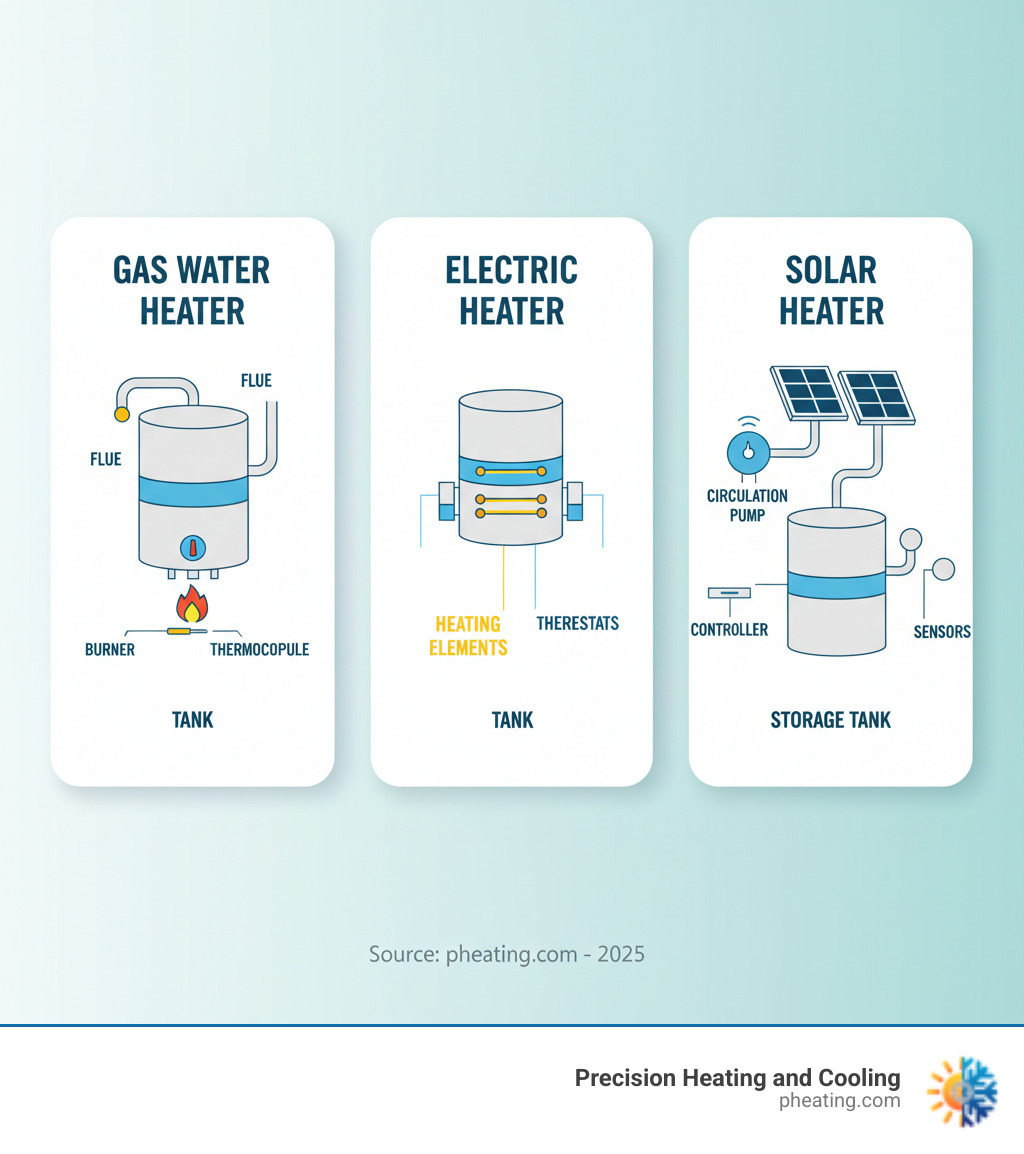
Explore more about solar water heater repair:
Diagnosing Common Water Heater Problems
Many water heater issues show clear warning signs before you're left in the cold. Understanding these signs helps you know when to call for help.
No hot water is the most obvious sign. For gas heaters, this often points to a pilot light or thermocouple issue. Electric systems may have a tripped breaker or failed heating element. For solar systems, a lack of hot water on a sunny day suggests a problem with the collectors, circulation pump, or controller, which requires specialized solar water heater repair.
Inconsistent temperatures that fluctuate from hot to cold can be caused by a faulty thermostat or a broken dip tube in traditional tanks. In solar systems, inaccurate sensor readings or a struggling auxiliary heater are common culprits.
Leaks and pooling water demand immediate attention. Leaks can come from loose pipe connections, a failing pressure relief valve, or a corroded tank. For solar systems, leaks can also originate from the collector panels on your roof or their connecting pipes. Addressing leaks promptly prevents costly water damage.

Strange noises like popping or rumbling usually indicate sediment buildup at the bottom of the tank, which forces the heating element to work harder. In active solar systems, a grinding or whining pump may signal a failing motor.
Discolored or smelly water points to internal issues. Rusty-colored water often means the tank is corroding or the anode rod has failed. A rotten egg smell typically indicates bacteria reacting with the anode rod.
Low hot water pressure, especially when cold water pressure is normal, is often caused by mineral and sediment buildup inside the pipes or the water heater itself. This is a frequent problem in the Bay Area due to hard water.
Recognizing these signs early helps you address problems before they become emergencies. For more insights, check out our article on common water heater repair issues and how our technicians resolve them. If you have a tankless system, learn about signs tankless water heater needs repair.
The Unique Challenges of Solar Water Heater Repair
Solar water heater repair is different from fixing a traditional unit. A solar water heater is a hybrid system combining plumbing, electrical components, and rooftop installations. Troubleshooting requires a specialized understanding of how solar technology works, from sun angles and heat transfer to pump controllers and sensors.
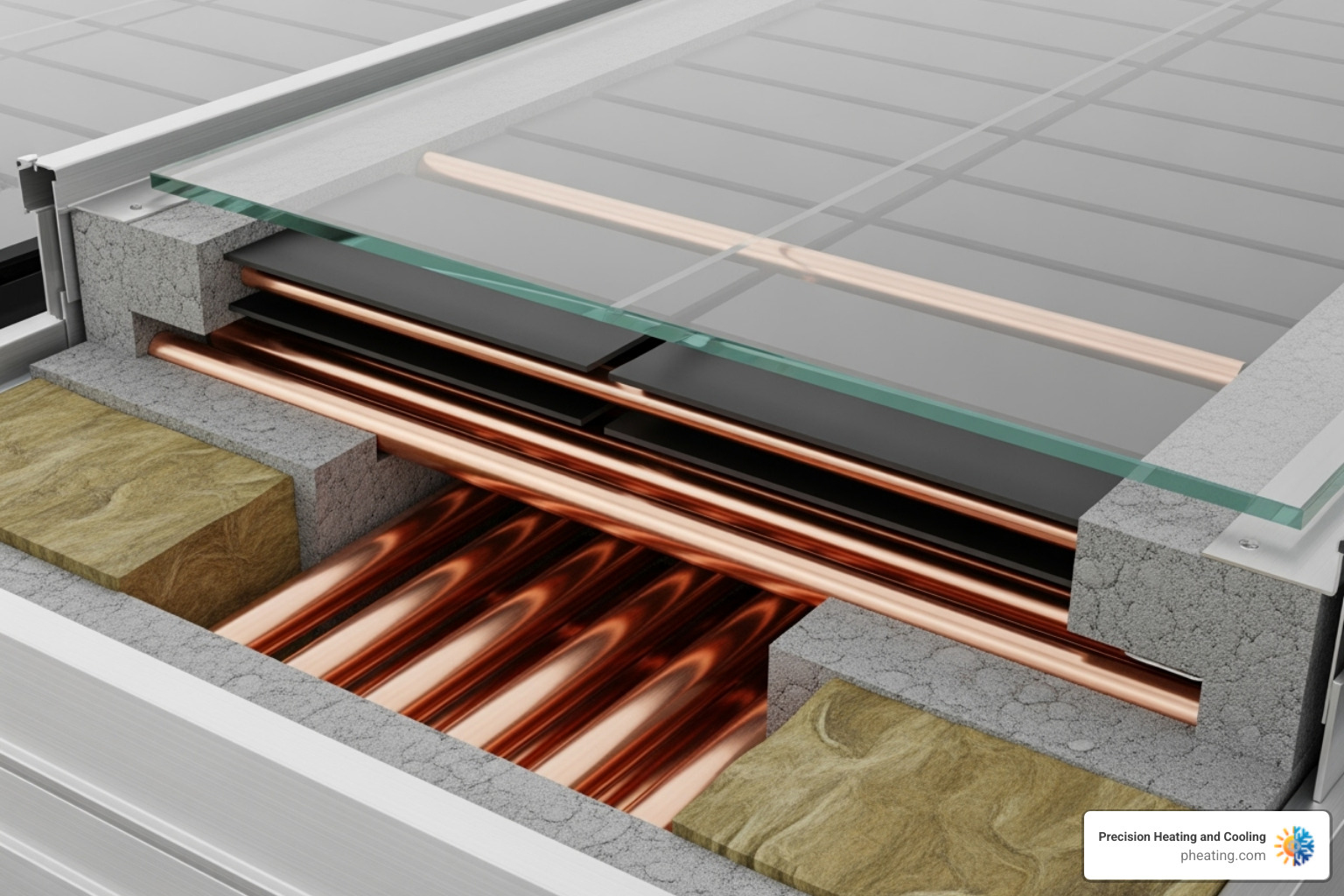
Understanding Your Solar System: Active vs. Passive
Solar water heaters fall into two categories, and the type you have dictates the repair approach.
Active systems use electric pumps, sensors, and a controller to circulate a heat-transfer fluid between the rooftop collectors and the storage tank. This makes them efficient but also more complex. Solar water heater repair on active systems often involves troubleshooting electrical components, testing sensors, or diagnosing pump failures.
Passive systems rely on natural physics (thermosiphon effect) instead of pumps. With fewer moving parts, they are generally more reliable but may be less efficient. Repairs typically focus on plumbing issues like leaks, insulation problems, or physical damage to the collector.
| Feature | Active System | Passive System |
|---|---|---|
| Circulation | Electric pump | Natural convection (Thermosiphon) or direct heating |
| Key Components | Collectors, pump, controller, sensors, storage tank | Collectors/tank integrated, storage tank |
| Complexity | Higher | Lower |
| Common Failure | Pump failure, controller malfunction, sensor errors | Leaks, insulation degradation, collector damage |
| Repair Focus | Electrical, mechanical, fluid dynamics | Plumbing, structural integrity |
Troubleshooting Common Solar Water Heater Repair Issues
When a solar water heater fails, we investigate several unique issues:
Collector Problems: The collectors face constant exposure to the elements. We inspect for cracked or shattered glazing (the protective glass), which reduces efficiency and lets water in. We also check for soiling from dust, pollen, or debris that can block sunlight, as well as any new shading from trees or structures that could reduce output.
Pump and Controller Failures: In active systems, a failing circulation pump won't move heat from the collectors to the tank. The pump might make grinding noises, fail to run, or run constantly. The controller, or the system's brain, can also malfunction, failing to activate the pump at the right times. We check for error codes and test the controller's logic.
Sensor Problems: The controller relies on accurate temperature readings from sensors. If a sensor is faulty or has moved, the system will behave erratically. We test each sensor to ensure it's providing correct data.
Fluid Leaks: Leaks in the collector array or connecting pipes can waste heat-transfer fluid, damage your roof, and reduce system efficiency.
The U.S. Department of Energy provides more detail in their guide on Solar Water Heating System Maintenance and Repair.
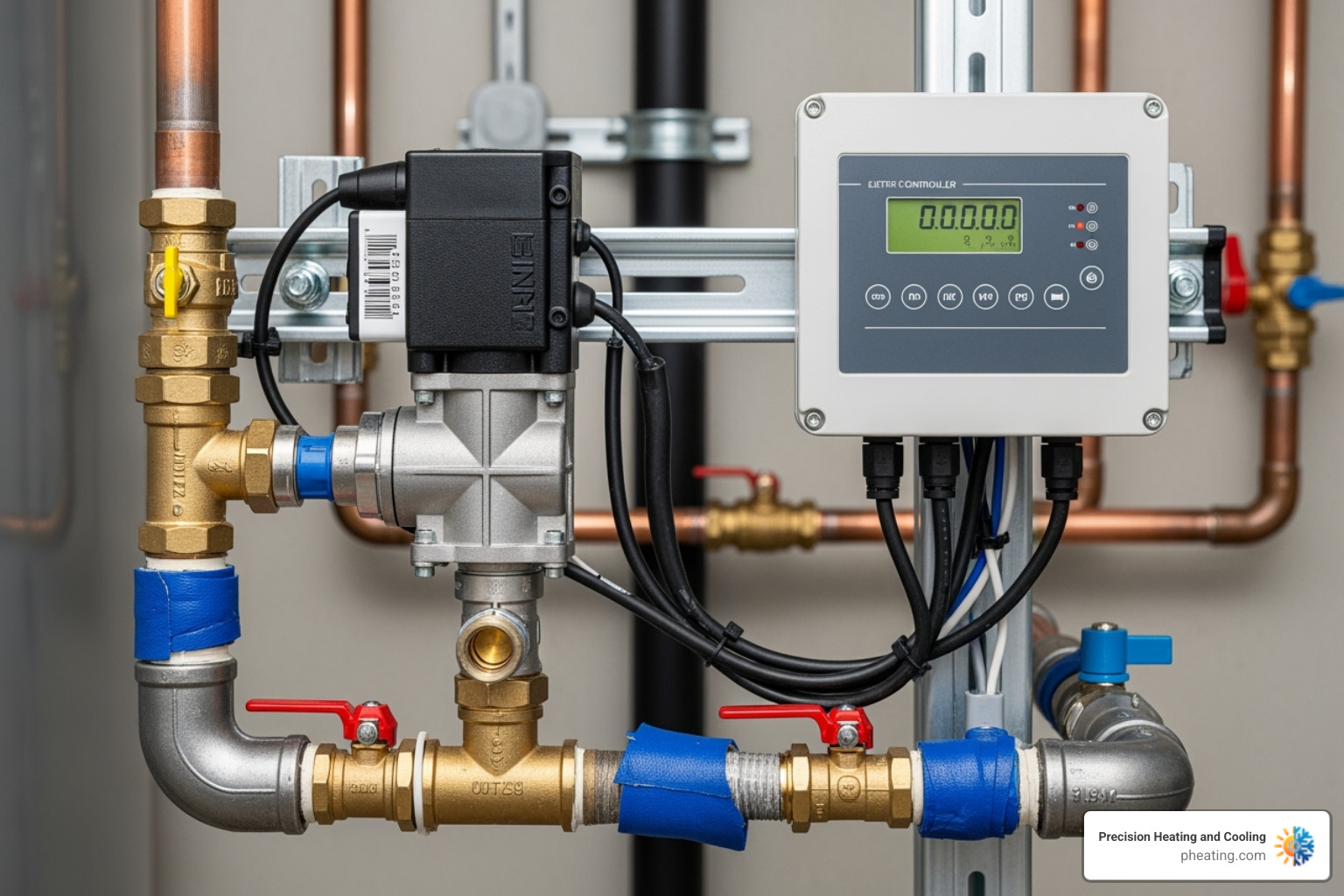
The Impact of Hard Water and Mineral Buildup
Hard water, common in the Bay Area, is a major threat to your solar water heater. As water heats, dissolved minerals like calcium and magnesium form scale, a crusty buildup that insulates against heat transfer. In direct systems, scale clogs the collector tubes, drastically reducing efficiency. In all systems, it forces the auxiliary heater to work harder, increasing energy bills.
This buildup can also lead to clogged pipes, reduced hot water pressure, and added stress on pumps. Regular flushing of the tank and heat exchangers can help dissolve these mineral deposits. For a long-term solution, a whole-home water softener prevents scale from forming in the first place, protecting your investment. We address these issues as part of our comprehensive local water heater service.
DIY vs. Professional Repair: A Safety-First Guide
While DIY projects can be satisfying, solar water heater repair involves risks that often outweigh the savings. These systems combine scalding water, high pressure, complex electrical wiring, and rooftop work—a dangerous mix for the inexperienced. A DIY mistake can void your warranty, cause personal injury from burns or falls, or lead to more extensive damage, turning a small fix into a costly replacement.
When to Call a Professional
- Rooftop Work: Accessing solar collectors requires proper safety equipment and training to prevent falls. This work should always be left to insured professionals.
- Electrical Components: Working with pumps, controllers, sensors, and wiring is hazardous without proper knowledge. Electricity and water are a dangerous combination.
- Complex Plumbing: Beyond tightening an accessible fitting, tasks like soldering pipes or handling specialized heat-transfer fluids require professional tools and expertise.
If you feel unsure about any repair, trust your instinct and call a professional. You can learn more about how we handle water heater repair to see what professional service entails.
Safe Shutdown and Draining Procedures
Before any maintenance, you must know how to safely shut down and drain your water heater. If you are not confident, call a professional.
- Turn Off Power: For an electric heater, turn off its circuit breaker. For a gas heater, turn the gas valve to "OFF." For solar systems, also disable power to the circulation pump and controller.
- Shut Off Water: Turn the cold water inlet valve clockwise to stop the water supply to the tank.
- Connect a Drain Hose: Attach a garden hose to the drain valve at the bottom of the tank. Run the other end to a safe drainage area.
- Drain the Tank: Open the drain valve. To allow air in and help the tank drain, open a hot water faucet somewhere in your house.
For basic maintenance, you'll need tools like an adjustable wrench, screwdrivers, a hose, heat-resistant gloves, and safety glasses.
DIY Solar Water Heater Repair: What You Can (and Can't) Do
Some preventative tasks are safe for homeowners, while others require professional expertise.
What You CAN Safely Do:
- Clean Solar Collectors: Gently wash collectors with mild soap and water on a cloudy day or in the morning to remove dirt and improve efficiency. Only do this if you can access them safely without getting on a roof.
- Check for Visible Leaks: Regularly inspect accessible pipes and connections for drips or mineral deposits.
- Inspect Insulation: Look for and repair any tears or damage to the insulation on your pipes and tank.
- Monitor Performance: Pay attention to your hot water supply. If it seems less effective on sunny days, it's an early warning sign that something is wrong.
What You CAN'T Safely Do:
- Replace Pumps or Repair Controllers: This involves electrical and plumbing work that is best left to a trained technician.
- Perform Major Roof Work: Replacing collector panels or repairing pipes on the roof requires professional safety gear and expertise.
- Handle Heat-Transfer Fluid: Checking or replacing specialized antifreeze requires specific equipment and knowledge.
- Internal Tank Repairs: Replacing heating elements or anode rods, especially in solar tanks with extra connections, is a job for a pro. For context on similar jobs, see our guide on water heater thermocouple replacement.
Extending Your System's Lifespan: Maintenance and Prevention
A well-maintained solar water heater can last 20 to 30 years, far longer than the 10 to 15-year lifespan of a conventional unit. This longevity is the direct result of consistent maintenance. Regular inspections, cleaning, and proactive service prevent minor issues from becoming major breakdowns, saving you money on energy and avoiding costly solar water heater repair.
A simple maintenance schedule, combining homeowner vigilance with expert care, is the key to keeping your system running at peak efficiency. We're committed to helping you care for all types of water heaters, ensuring you get the most from your investment.
Best Practices for Solar Water Heater Maintenance
To maximize your system's lifespan and efficiency, follow these best practices:
- Annual Professional Inspections: A technician can spot potential issues with pumps, sensors, and controllers before they escalate.
- Check Antifreeze Fluid: In closed-loop systems, the heat-transfer fluid should be checked every 3-5 years to ensure it provides adequate freeze and corrosion protection.
- Inspect Seals and Insulation: Degraded seals can cause leaks, while damaged insulation leads to heat loss. These should be checked and repaired during inspections.
- Keep Collectors Clean: Soiled collectors can lose significant efficiency. Clean them regularly, but only if you can do so safely without climbing on the roof.
- Monitor System Pressure: In closed-loop systems, incorrect pressure can reduce heat transfer. A technician will check this during an inspection.
- Flush the Storage Tank: Annually flushing the tank removes sediment buildup, which is especially important in areas with hard water.
- Test the Pressure Relief Valve: This critical safety device should be tested annually to ensure it functions correctly.
Regular tune-ups are so valuable that some regions offer incentives, like the Solar Water Heater Tune-Up – Hawaii Energy program.
When to Repair vs. Replace Your Water Heater
Deciding between repair and replacement can be tough. Here are the key factors we consider to help homeowners make a cost-effective choice:
- Age of the System: If a solar water heater is approaching 20-30 years (or a traditional tank is past 10-15 years), replacement is often more sensible than major repairs.
- Frequency and Cost of Repairs: If you're facing constant breakdowns, the cumulative repair costs can quickly approach the price of a new unit. A good guideline is the 50% rule: if a repair costs more than half the price of a replacement, a new unit is usually the better investment.
- Extent of Damage: A leaking storage tank almost always signals that it's time for a replacement. While replacing a pump or sensor is a viable repair, a corroded tank is a fatal flaw.
- Warranty Coverage: If a major component is still under warranty, a repair is the clear choice. If not, the full cost of parts and labor may make replacement more appealing.
- Energy Efficiency: A new water heater will be more efficient than an older model, offering long-term savings on your utility bills.
If you decide a new unit is the right path, we can help with finding a reliable water heater replacement service.
Frequently Asked Questions about Water Heater Repair
Homeowners often have questions about their water heaters, especially when it comes to the complexities of solar water heater repair. Here are answers to some of the most common inquiries we receive.
How do I test if a water heater repair has been successful?
After a repair, you can verify its success with a few simple checks:
- Check for Leaks: Carefully inspect the work area, pipe connections, and the base of the tank for any signs of moisture.
- Verify Water Temperature: Run a hot water faucet. The water should heat up promptly and maintain a consistent, hot temperature.
- Listen for Noises: The strange sounds you heard before the repair (popping, grinding, etc.) should be gone. The system should operate quietly.
- Monitor Pressure Gauges: If your system has them, ensure the pressure readings are stable and within the manufacturer's recommended range.
If any of the original symptoms return after a day or two, call your technician back.
What are the signs a solar water heater's pump or controller is failing?
The pump and controller are the heart and brain of an active solar water heater. Here are the warning signs that they may be failing:
- Pump Runs Constantly: A pump that runs at night or on cloudy days may indicate a faulty sensor or controller.
- Pump Never Runs: If the pump doesn't turn on during a sunny day, the motor may have failed, or the controller isn't sending the signal to activate.
- No Hot Water on Sunny Days: This is the most common symptom, indicating that heat captured by the collectors isn't being circulated to the tank.
- Controller Error Codes: Many modern controllers display error codes that can pinpoint the exact problem.
- Inaccurate Temperature Readings: If the controller displays temperatures that don't make sense, a sensor has likely failed or become dislodged.
Promptly addressing these symptoms can prevent further stress on your system. We can diagnose these issues and perform the right solar water heater repair to get your system back online.
Your Trusted Partner for All Water Heater Services
From diagnosing common issues to navigating the specialized world of solar water heater repair, one thing is clear: reliable hot water is essential to your daily life. Whether you have a solar, gas, electric, or tankless system, it needs expert attention when problems arise.
At Precision Heating and Cooling, we have over two decades of experience with every type of water heater. We understand that a solar collector issue requires a different skill set than a faulty gas valve, and our team is equipped to handle it all. Our commitment is to provide lasting solutions, not just quick fixes.
When you call us for a solar water heater repair in Sunnyvale or a tank issue in San Jose, you're getting a team that prioritizes reliability and expertise. We proudly serve the entire San Jose Bay Area and Central Valley, including Cupertino, Los Gatos, Palo Alto, Santa Clara, and Hanford. With flexible payment options and a commitment to competitive service, we make it easy to get the professional help you need.
Don't let water heater problems disrupt your comfort. We're here to restore your hot water and your peace of mind.

Flexible payment options to make your goals affordable and stress-free.

Keeping it Close: Local Heater Installation Services in Santa Clara
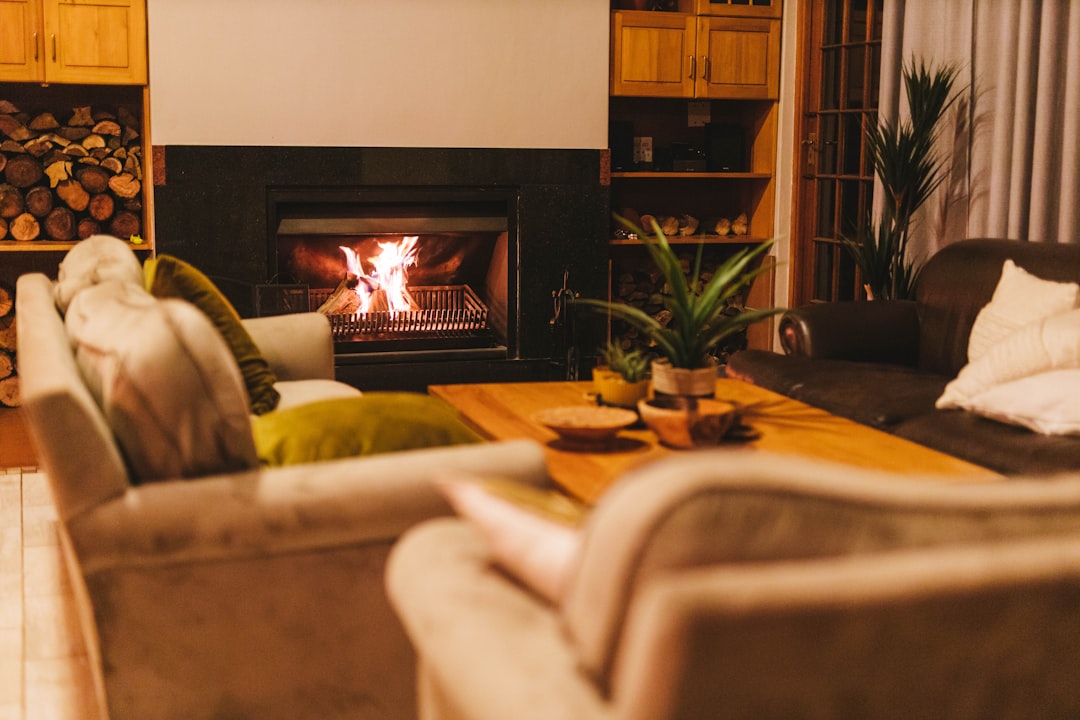
Heater Installation Without Breaking the Bank in Santa Clara













.avif)

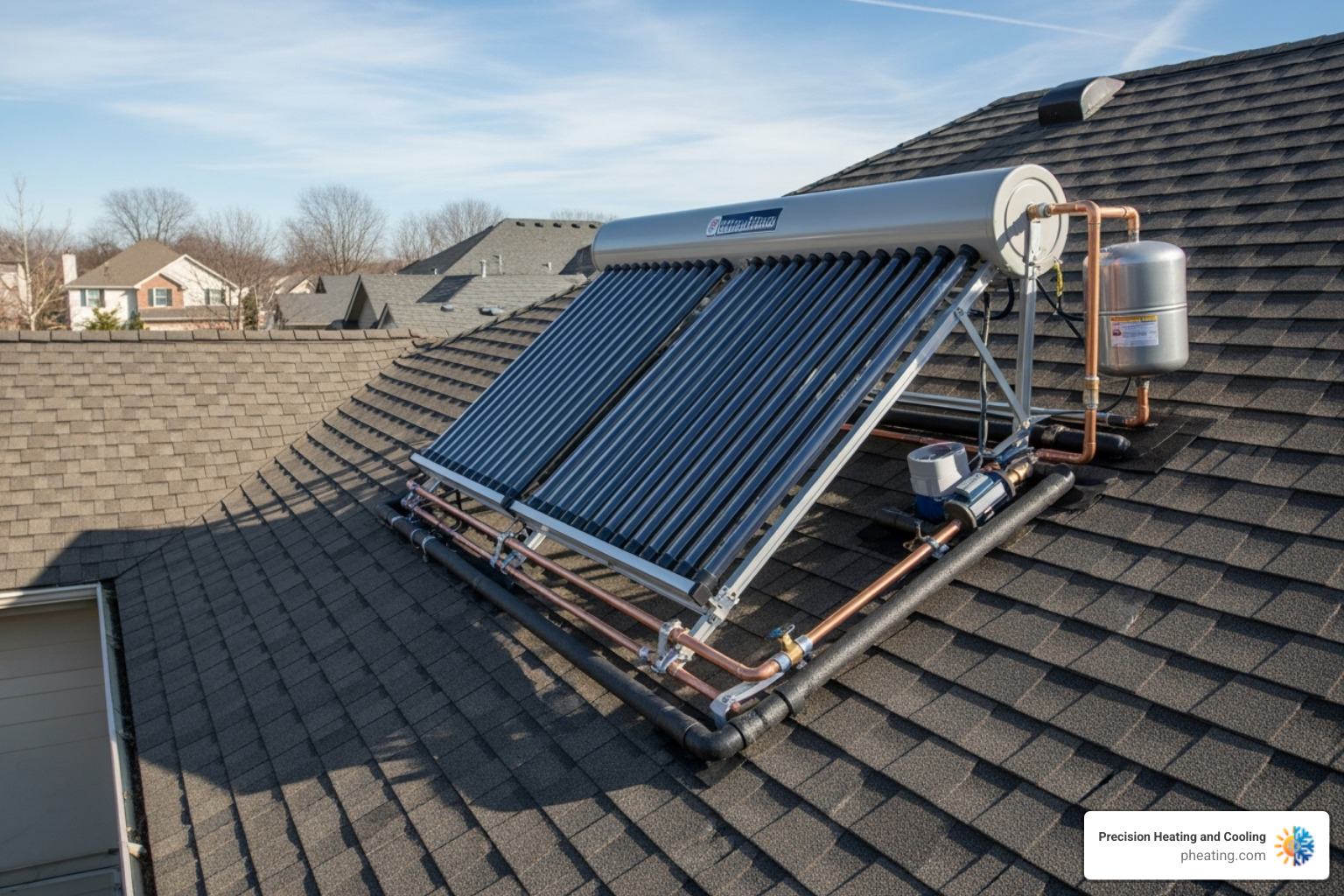








.avif)